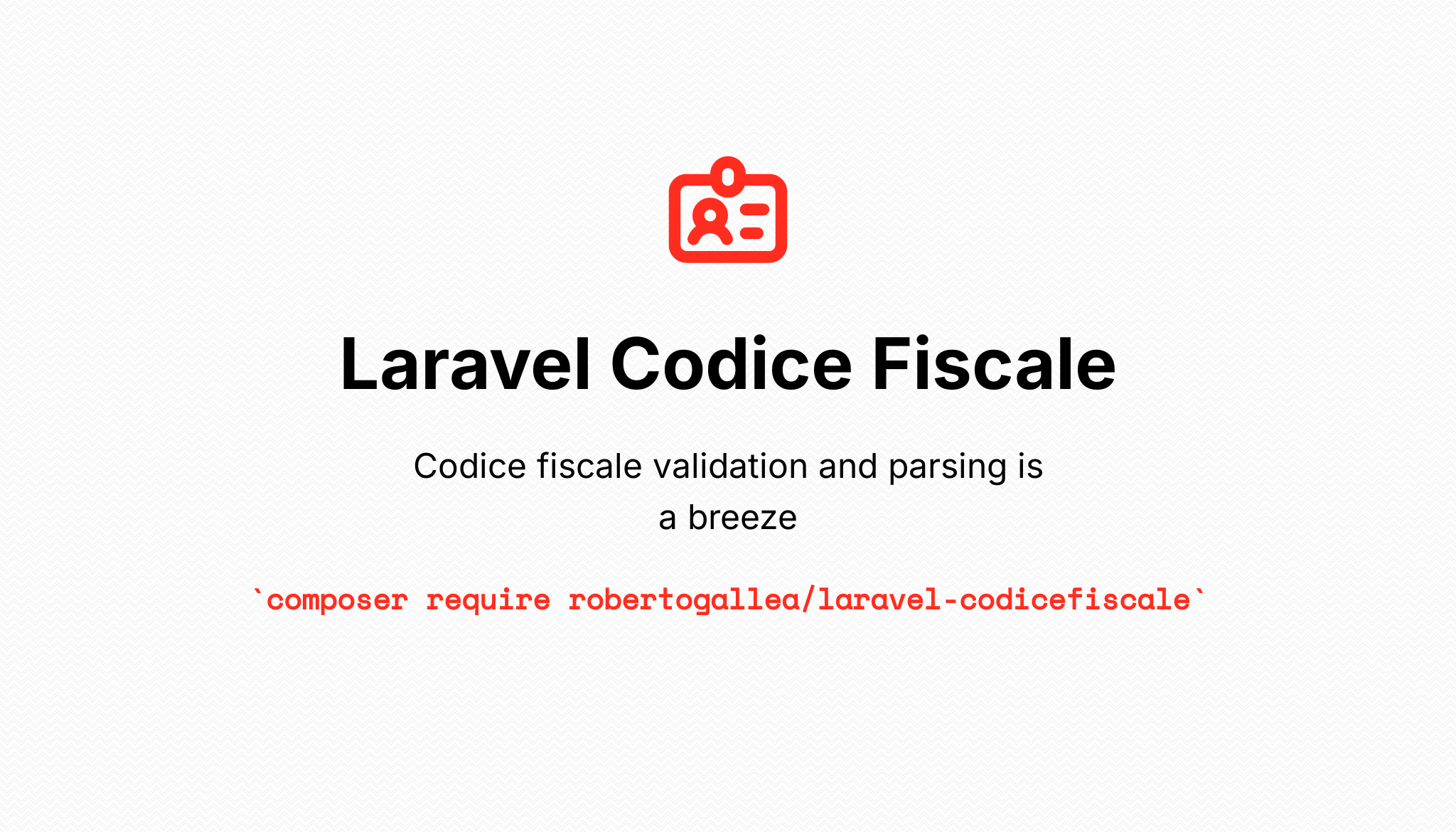
laravel-codicefiscale
laravel-codicefiscale is a package for the management of the Italian CodiceFiscale (i.e. tax code).
The package allows easy validation and parsing of the CodiceFiscale. It is also suited for Laravel since it provides a
convenient custom validator for request validation.
Laravel Version Compatibility
| Laravel | Package |
|---|---|
| 11.x | 2.x |
| 10.x | 1.x |
| 9.x | 1.x |
| 8.x | 1.x |
| 7.x | 1.x |
| 6.x | 1.x |
Important update: now you can dynamically load city codes from ISTAT using the non-default
IstatRemoteCSVListcity decoder.
- Installation
- Configuration
- Validation
- Utility CodiceFiscale class
- Codice fiscale Generation
- Faker integration
- City code parsing
- Integrate your own cities
Installation
Run the following command to install the latest applicable version of the package:
composer require robertogallea/laravel-codicefiscale:^2Laravel
In your app config, add the Service Provider to the $providers array (only for Laravel 5.4 or below):
'providers' => [
...
robertogallea\LaravelCodiceFiscale\CodiceFiscaleServiceProvider::class,
],The validation error messages are translated in it and en languages, if you want to add new language please send me
a PR.
Lumen
In bootstrap/app.php, register the Service Provider
$app->register(robertogallea\LaravelCodiceFiscale\CodiceFiscaleServiceProvider::class);Configuration
To customize the package configuration, you must export the configuration file into config/codicefiscale.php.
This can be achieved by launching the following command:
php artisan vendor:publish --provider="robertogallea\LaravelCodiceFiscale\CodiceFiscaleServiceProvider" --tag="config"You can configure the following parameters:
city-decoder: the class used for decoding city codes (see City code parsing), default toInternationalCitiesStaticList.date-format: the date format used for parsing birthdates, default to'Y-m-d'.labels: the labels used formaleandfemalepersons, defaults to'M'and'F'.
Language Files
You can customize the validation messages publishing the validation translations with this command:
php artisan vendor:publish --provider="robertogallea\LaravelCodiceFiscale\CodiceFiscaleServiceProvider" --tag="lang"Validation
To validate a codice fiscale, use the codice_fiscale keyword in your validation rules array
public function rules()
{
return [
'codicefiscale' => 'codice_fiscale',
//...
];
}From version 1.9.0 you can validate your codice fiscale against other form fields to check whether there is a match or not.
You must specify all of the required fields:
first_namelast_namebirthdateplacegender
giving parameters to the codice_fiscale rule.
For example:
public function rules()
{
return [
'codicefiscale' => 'codice_fiscale:first_name=first_name_field,last_name=last_name_field,birthdate=birthdate_field,place=place_field,gender=gender_field',
'first_name_field' => 'required|string',
'last_name_field' => 'required|string',
'birthdate_field' => 'required|date',
'place_field' => 'required|string',
'gender_field' => 'required|string|max:1',
//...
];
}Validation fails if the provided codicefiscale and the one generated from the input fields do not match.
Utility CodiceFiscale class
A codice fiscale can be wrapped in the robertogallea\LaravelCodiceFiscale\CodiceFiscale class to enhance it with
useful utility methods.
use robertogallea\LaravelCodiceFiscale\CodiceFiscale;
...
try {
$cf = new CodiceFiscale();
$result = $cf->parse('RSSMRA95E05F205Z');
var_dump($result);
} catch (Exception $exception) {
echo $exception;
}In case of a valid codicefiscale it produces the following result:
[
"gender" => "M"
"birth_place" => "F205"
"birth_place_complete" => "Milano",
"day" => "05"
"month" => "05"
"year" => "1995"
"birthdate" => Carbon @799632000 {
date: 1995-05-05 00:00:00.0 UTC (+00:00)
}
]in case of an error, CodiceFiscale::parse() throws an CodiceFiscaleValidationException, which returns one of the
defined constants with $exception->getCode():
CodiceFiscaleException::NO_ERRORCodiceFiscaleException::NO_CODECodiceFiscaleException::WRONG_SIZECodiceFiscaleException::BAD_CHARACTERSCodiceFiscaleException::BAD_OMOCODIA_CHARCodiceFiscaleException::WRONG_CODECodiceFiscaleException::MISSING_CITY_CODE
If you rather not want to catch exceptions, you can use CodiceFiscale::tryParse():
use robertogallea\LaravelCodiceFiscale\CodiceFiscale;
...
$cf = new CodiceFiscale();
$result = $cf->tryParse('RSSMRA95E05F205Z');
if ($result) {
var_dump($cf->asArray());
} else {
echo $cf->getError();
}which returns the same values as above, you can use $cf->isValid() to check if the codicefiscale is valid and
$cf->getError() to get the error.
This is especially useful in a blade template:
@php($cf = new robertogallea\LaravelCodiceFiscale\CodiceFiscale())
@if($cf->tryParse($codicefiscale))
<p><i class="fa fa-check" style="color:green"></i>{{$cf->getCodiceFiscale()}}</p>
@else
<p><i class="fa fa-check" style="color:red"></i>{{$cf->getError()->getMessage()}}</p>
@endifCodice fiscale Generation
Class CodiceFiscale could be used to generate codice fiscale strings from input values:
$first_name = 'Mario';
$last_name = 'Rossi';
$birth_date = '1995-05-05'; // or Carbon::parse('1995-05-05')
$birth_place = 'F205'; // or 'Milano'
$gender = 'M';
$cf_string = CodiceFiscale::generate($first_name, $last_name, $birth_date, $birth_place, $gender);Faker integration
You can generate fake codice fiscale in your factories using the provided faker extension:
class PersonFactory extends Factory
{
public function definition(): array
{
return [
'first_name' => $firstName = fake()->firstName(),
'last_name' => $lastName = fake()->lastName(),
'fiscal_number' => fake()->codiceFiscale(firstName: $firstName, lastName: $lastName),
];
}Note: you can provide some, all or none of the information required for the generation of codice fiscale
(firstName, lastName, birthDate, birthPlace, gender)
City code parsing
There are three strategies for decoding the city code:
InternationalCitiesStaticList: a static list of Italian cities;ItalianCitiesStaticList: a static list of International cities;IstatRemoteCSVList: a dynamic (loaded from web) list of Italian cities loaded from official ISTAT csv file. Please note that the list is cached (one day by default, see config to change).CompositeCitiesList: merge the results from twoCityDecoderInterfaceclasses (for exampleIstatRemoteCSVListandInternationalCitiesStaticList) using the baseCityDecoderInterfacein the config keycodicefiscale.cities-decoder-list.
By default, the package uses the class InternationalCitiesStaticList to lookup the city from the code and viceversa.
However, you could use your own class to change the strategy used.
You just need to implement the CityDecoderInterface and its getList() method.
Then, to use it, just pass an instance to the CodiceFiscale class.
For example:
class MyCityList implements CityDecoderInterface
{
public function getList()
{
// Implementation
}
}...
$cf = new CodiceFiscale(new MyCityList)
...Integrate your own cities
Note: if you find missing cities, please make a PR!
If you want to integrate the cities list, you can use the CompositeCitiesList by merging the results of one of the
decoders provided and a custom decoder.
For example:
// conf/codicefiscale.php
return [
'city-decoder' => '\robertogallea\LaravelCodiceFiscale\CityCodeDecoders\CompositeCitiesList',
...
'cities-decoder-list' => [
'\robertogallea\LaravelCodiceFiscale\CityCodeDecoders\InternationalCitiesStaticList',
'YourNamespace\MyCustomList',
]where MyCustomList is defined as:
...
class MyCustomList implements CityDecoderInterface
{
public function getList()
{
return [
'XYZ1' => 'My city 1',
'XYZ2' => 'My city 2',
]
}
}




